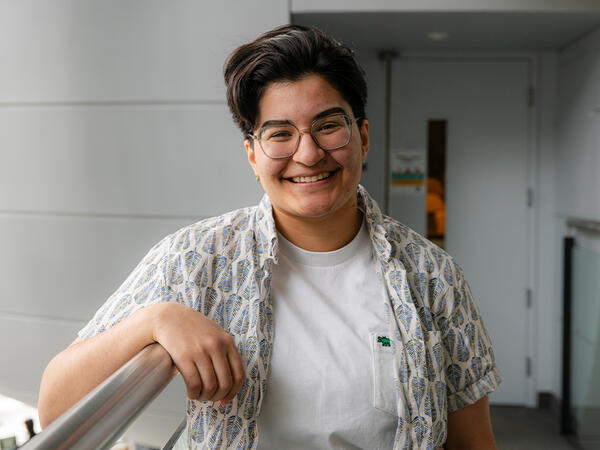What is your academic background and why is this area of research important?
I completed my Specialized Honours Bachelor of Science degree in Chemistry (Pharmaceutical and Biological stream) at York University in 2023 before joining the Department of Pharmaceutical Science at the University of Toronto. I am currently a second year PhD student under the supervision of Dr. Shirley X.Y. Wu. My current research focuses on the development of new strategies and novel nanoparticles to overcome hypoxia induced radiation resistance in primary and secondary brain tumours. This area of research is imperative, as tumor hypoxia is a major factor in treatment failure and disease progression, particularly in aggressive brain tumours such as glioblastoma multiforme. By designing smart, responsive nanomaterials that can target and modulate the hypoxic tumor microenvironment, I aim to enhance the efficacy of radiation therapy and enable the development of more personalized, precise cancer therapeutics. The translational nature of this work has the potential to significantly improve outcomes for patients facing some of the most challenging and treatment resistant forms of cancer, which often have a dismal prognosis.
What led you to your current Supervisor’s lab/research group?
During my undergraduate degree I had the pleasure of completing my undergraduate thesis project under the supervision of Dr. Jennifer I. L. Chen where I worked to synthesize Mn (II) doped quantum dots for photocatalytic applications. During this time, I fell in love with the world of nanomaterials and knew it was the area I wanted to explore further in my graduate studies.
While researching innovative applications of nanomaterials in medicine, I came across the groundbreaking work of Dr. Wu’s lab on MnO₂ nanoparticles designed to modulate the solid tumor microenvironment through attenuating hypoxia and acidosis to enhance radiation response. Dr. Wu’s Advanced Pharmaceutics and Drug Delivery Laboratory immediately stood out to me as a dynamic and transformative research environment. The lab’s development of cleverly designed responsive nanomaterials for targeted drug delivery and cancer theranostics immediately drew my interest. Combined with its highly interdisciplinary team, it became the ideal place for me to develop as a well-rounded scientist and contribute to meaningful advancements in cancer nanomedicine.
What are some of the challenges you had to overcome within your research?
Coming from a chemistry background, one of the biggest challenges I faced at the start of my graduate studies was transitioning to work involving living cells and animal models. Unlike chemical synthesis, where reactions can often be repeated or optimized efficiently, biological systems introduce a new layer of complexity and variability. I had to quickly adapt to the unpredictability inherent in working with cells and animals, learning to account for biological variability, growth timelines, and the importance of experimental timing.
The adjustment was especially difficult in the beginning, as I was used to the immediate feedback loop of chemistry research. In contrast, in vitro and in vivo studies require significantly more planning and patience. Cells need time to grow to high confluency, and animal studies bring up personal ethical considerations and demand rigorous coordination. Learning to navigate these challenges has not only expanded my technical tool kit but also taught me the importance of resilience, troubleshooting, and thoughtful experimental design in pharmaceutical science research.
How do you see your current research playing a role in your career?
My current research is a significant stepping stone in shaping the trajectory of my career. Working at the intersection of nanotechnology and cancer therapeutics has not only deepened my scientific knowledge and critical thinking skills but also solidified my passion for translational research. Ultimately, whether I pursue a career in academia or industry, my current research enables me to lead interdisciplinary research focused on developing next-generation precision therapeutics.
The skills I’ve learned in Dr. Wu’s lab, ranging from nanoparticle formulation and characterization to in vitro and in vivo evaluation, along with skills I continue to develop, equip me to drive innovation and bring forward new solutions to address unmet clinical needs, especially in oncology. As I continue to grow as a researcher, my goal is to lead work that not only advances scientific knowledge but also drives meaningful, lasting improvements in patient care, moving away from a one-size fits all approach towards more personalized and precise treatment strategies.
What do you like to do when you are not working on research?
I currently serve as a co-chair of AAPS (American Association of Pharmaceutical Scientists) University of Toronto Student Chapter, where I lead the team in organizing a variety of initiatives that support academic, professional, and community development. Our team organizes youth outreach events aimed at inspiring the next generation of scientists, as well as international. We coordinate networking opportunities with alumni and industry speakers that help graduate students connect with mentors, explore career paths, and build meaningful professional relationships. This leadership experience has significantly deepened my commitment to fostering a collaborative and supportive scientific community.
Outside of the university I like to stay active through biking, hiking, and playing for a local rugby club. In my downtime I like to read, prefect my latte art, and spend time with my cats! I try my best to maintain a research-life balance in order to recharge, stay motivated, and grow as a well-rounded individual.
More News
Image

Faces of PharmSci: Mahya Rezaeifarimani
Supervised by Prof. Shirley Wu, PhD student Mahya Rezaeifarimani is developing smart nanoparticles to help make radiation therapy work better for brain tumours by targeting low-oxygen areas that often make treatment less effective.
Read More
Image

Dean Lisa Dolovich reappointed for second term
Professor Lisa Dolovich has been reappointed for a second term as Dean of the Leslie Dan Faculty of Pharmacy, University of Toronto, effective July 1, 2025, to December 30, 2030.
Read More
Image

Pharmacy Summer Camp gives high school students insight into pharmacy profession
A new summer camp based at the faculty will give high school students a range of experiences in pharmacy and pharmaceutical sciences.
Read More
